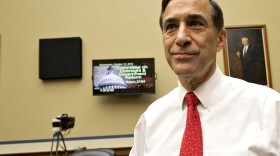
Linton Weeks
Linton Weeks joined NPR in the summer of 2008, as its national correspondent for Digital News. He immediately hit the campaign trail, covering the Democratic and Republican National Conventions; fact-checking the debates; and exploring the candidates, the issues and the electorate.
Weeks is originally from Tennessee, and graduated from Rhodes College in 1976. He was the founding editor of Southern Magazine in 1986. The magazine was bought — and crushed — in 1989 by Time-Warner. In 1990, he was named managing editor of The Washington Post's Sunday magazine. Four years later, he became the first director of the newspaper's website, Washingtonpost.com. From 1995 until 2008, he was a staff writer in the Style section of The Washington Post.
He currently lives in a suburb of Washington with the artist Jan Taylor Weeks. In 2009, they created The Stone and Holt Weeks Foundation to honor their beloved sons.
-
More than 60 percent of the Senate and most members of the House of Representatives are millionaires. California Republican Darrell Issa tops the list, with an estimated net worth of more than $355 million. A public policy professor tells Americans how to put more working-class people in Congress.
-
Finding poetry / in the news of the moment / can be rewarding.
-
U.S.There is a history of well-heeled commanders in chief. "I still think it is possible for a person of modest means to become president — if the conditions are just right," one presidential historian says. "But wealth has always been a major qualifying factor for the presidency."
-
In professional baseball, what's known as retaliation — when the pitcher from one team will intentionally throw the ball at a batter from the other team — can be risky business.
-
Mark Leibovich, author of a just-published book about the ickiness of Washington, makes a case for why people should care.
-
-
Finding the poetry in a presidential speech.
-
U.S.Contest results are in for the world's smallest office.
-
Ollie Cantos may be blind, but he sees a way to help three teenagers.
-
U.S.We are beyond the point where privacy can be expected because somebody somewhere has details about all of your electronic habits. The question is, who is most likely to want to look at what you're doing?









